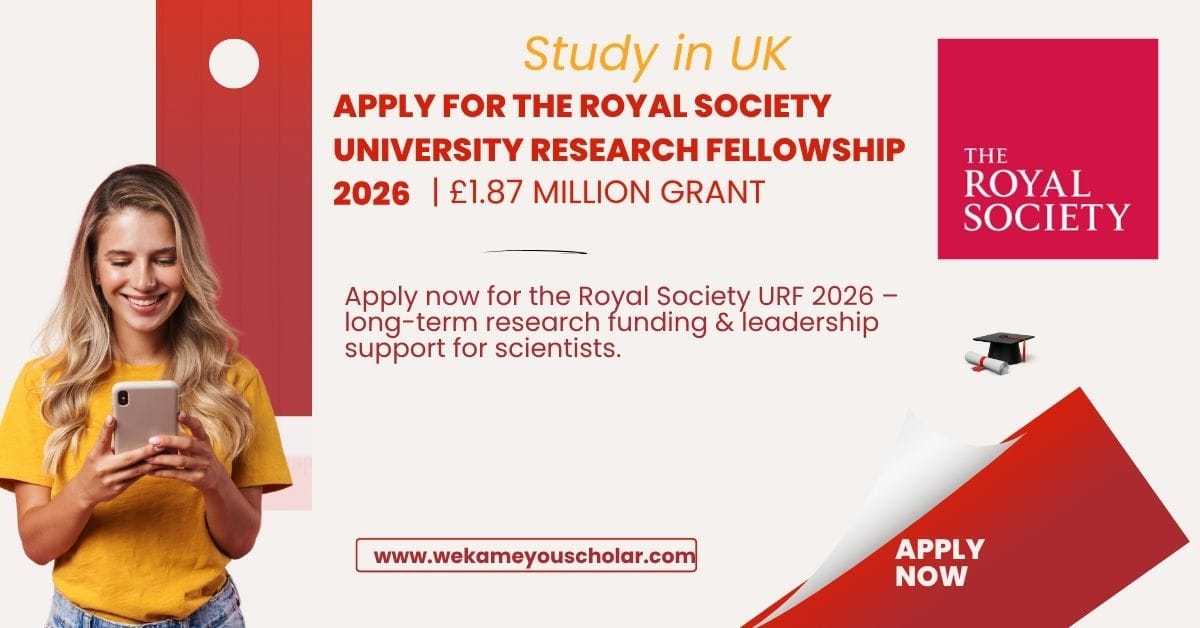Royal Society University Research Fellowship 2026 – £1.87M Funding for Future Research Leaders
The Royal Society University Research Fellowship (URF) is one of the UK’s most prestigious and competitive early-career research awards. Designed for outstanding scientists in the natural sciences, the fellowship provides long-term, flexible funding and training to help researchers establish independence, develop leadership, and pursue innovative, high-impact science.
Application Timeline
| Milestone | Date |
|---|---|
| Applications Open | 15 July 2025 |
| Deadline to Apply | 10 September 2025 |
| Final Decision Announced | By 30 June 2026 |
| Fellowship Start (Expected) | Academic Year 2026/27 |
Fellowship Objectives
The URF program is designed to:
Support researchers to build an independent research career
Provide long-term salary and project support
Foster leadership potential through tailored development and training
Encourage cross-disciplinary innovation and global engagement
Promote diversity, equity, and inclusion (EDI) across UK science
What Does It Offer?
Total Value:
Up to £1.87 million over 8 years
Duration:
Initial 5 years + possible 3-year extension (based on review)
Funding Covers:
PI salary contribution
Research costs (equipment, consumables, travel)
Staff support (e.g. research assistants or PhDs)
Indirect/estate costs for host institution
Visa & relocation costs for awardee and dependents
Childcare-related conference travel support
Full flexibility for career breaks, sabbaticals, or part-time work
Optional:
Support for new PhD studentship(s) (up to 4 years)
Who Should Apply?
The scheme is open internationally to early-career researchers who:
✅ Have 3–8 years post-PhD research experience (excluding breaks)
✅ Do not hold a permanent academic post
✅ Have not previously held a fellowship granting research independence
✅ Work in Royal Society’s natural sciences remit, including:
Biology and biomedical science
Chemistry and materials science
Engineering
Physics, maths, astronomy, computer science
Earth, environmental, and interdisciplinary sciences
Global Talent Visa fast-track endorsement is available.
Host Institution Requirements
Applicants must:
Be hosted by a UK or Republic of Ireland university or not-for-profit institution
Obtain strong institutional support (documented via a Head of Department statement)
NEW: From 2026, the HoD support letter will be visible to the applicant before submission
Support for Diversity & Disability
The Royal Society actively promotes EDI and provides:
Deadline extensions, if needed
Alternative application formats (e.g., Word doc)
Interview adjustments (accessibility tech, extended time, support staff)
Childcare or travel expense coverage for research events
If you’re a disabled applicant, confidential assistance is available via:
📧 ur*@**********ty.org | ☎️ +44 20 7451 2666
Application and Review Process
Step-by-Step:
Apply via Flexi-Grant® portal
Internal eligibility check by the Royal Society
Assigned to 1 of 5 Research Panels (based on field)
Initial Review by 2+ field experts
External Peer Review (if longlisted)
Shortlisting and in-person interviews
Final decision by June 2026
Research Panels Include:
Ai: Astronomy, physics, earth sciences
Aii: Chemistry and engineering
Aiii: Mathematics, computer science, theoretical physics
Bi: Molecular biology, zoology, physiology
Bii: Biomedical sciences
Recent Scheme Changes
✅ More transparency: Applicants can now read HoD support letters
✅ Enhanced host guidance: Universities receive better instruction on how to support fellows
✅ More flexible budgeting for relocation and research assistance
✅ Stronger EDI emphasis across review panels
Career Development Benefits
Royal Society URFs get access to:
Leadership & science communication training
Public engagement platforms
Policy contribution opportunities
STEM education outreach
Networking events with other fellows and alumni
View case studies:
🔹 [Dr. Amelie Saintonge – URF, Astrophysics]
🔹 [Dr. Asel Sartbaeva – University of Bath]
🔹 [Prof. Rahul Nair – Nanomaterials Researcher]
FAQs
1. Can I apply if I’ve already completed a major fellowship?
No. If you’ve held a previous award granting research independence (e.g., ERC Starting Grant, UKRI Future Leader), you are not eligible.
2. What if I’ve taken parental or sick leave during my career?
No problem. The Royal Society considers career breaks and allows flexibility in how your 3–8 years post-PhD window is calculated.
3. Is this fellowship renewable after eight years?
No. The URF provides non-renewable funding for up to 8 years, with years 6–8 contingent on a satisfactory mid-term review in year 4.
4. Is there any relocation support for international applicants?
Yes. The grant can exceed the £1.87M cap to cover justified relocation and visa costs for you and your dependents.
5. Do I need to find a host institution before applying?
Yes. You must secure a commitment from a UK or ROI university or research institution, including a Head of Department support letter, before applying.
More UK Scholarships
Academy of Medical Sciences Professorship Scheme 2025 (UK) – Round 13 Now Open
Royal Society UK Wolfson Fellowship 2025 – Secure £300,000 to Lead Research in the UK
LSHTM COMPASS Fellowship 2025 – Fully Funded MSc & Internship for African Health Researchers
Final Thoughts
If you’re an early-career scientist ready to launch an independent research career, the Royal Society URF 2026 offers a powerful platform—complete with funding, flexibility, mentorship, and prestige.
Apply now and become part of a network that includes some of the UK’s most influential scientists and changemakers.
👉 Deadline: 10 September 2025
🔗 Visit Official Page & Apply
For more scholarships, please visit wemakeyouscholar.com




